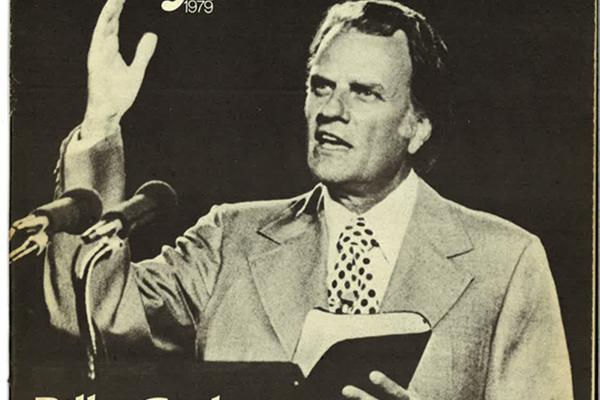IN 1978, a Sojourners subscriber sent me this quote from a European newspaper reporting on Billy Graham’s visit to the Nazi concentration camp in Auschwitz, Poland: “The present insanity of the global arms race,” Graham said, “if continued, will lead inevitably to a conflagration so great that Auschwitz will seem like a minor rehearsal.” The U.S. media had not reported on Graham’s statement.
I wrote to Billy Graham and asked if what he said, after visiting Auschwitz for the first time, indicated a change of heart for him on nuclear weapons. Billy wrote back to say it did. He agreed to an interview with Sojourners to explain how his thinking had changed about the nuclear arms race, saying that it felt to him like a moral and spiritual question and not just a political issue.
August marks the 71st anniversary of the U.S. atomic bombing of Hiroshima, Japan. When President Obama visited Hiroshima earlier this year, he encouraged leaders to “pursue a world without nuclear weapons” (which is sadly and dangerously ironic coming from a president who is overseeing a 30-year, $1 trillion upgrade of the U.S. nuclear weapons arsenal).
Billy Graham, in that 1979 interview with Sojourners, was clear in his view of the threat posed by nuclear weapons:
Is a nuclear holocaust inevitable if the arms race is not stopped? Frankly, the answer is almost certainly yes. Now I know that some people feel human beings are so terrified of a nuclear war that no one would dare start one. I wish I could accept that. But neither history nor the Bible gives much reason for optimism. What guarantee is there that the world will never produce another maniacal dictator like Hitler or Amin? As a Christian I take sin seriously, and the Christian should be the first to know that the human heart is deceitful and desperately wicked, as Jeremiah says. We can be capable of unspeakable horror, no matter how educated or technically sophisticated we are. Auschwitz is a compelling witness to this.
Read the Full Article

